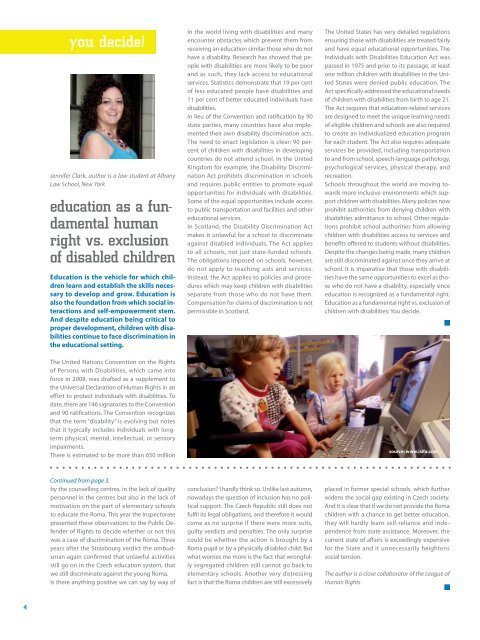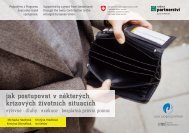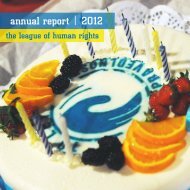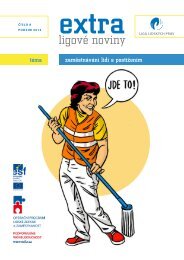EXTRA league papers | issue 3 | winter 2010 | What Schools Do We Want for our Children?
You also want an ePaper? Increase the reach of your titles
YUMPU automatically turns print PDFs into web optimized ePapers that Google loves.
4<br />
you decide!<br />
Jennifer Clark, author is a law student at Albany<br />
Law School, New York<br />
education as a fundamental<br />
human<br />
right vs. exclusion<br />
of disabled children<br />
Education is the vehicle <strong>for</strong> which children<br />
learn and establish the skills necessary<br />
to develop and grow. Education is<br />
also the foundation from which social interactions<br />
and self-empowerment stem.<br />
And despite education being critical to<br />
proper development, children with disabilities<br />
continue to face discrimination in<br />
the educational setting.<br />
The United Nations Convention on the Rights<br />
of Persons with Disabilities, which came into<br />
<strong>for</strong>ce in 2008, was drafted as a supplement to<br />
the Universal Declaration of Human Rights in an<br />
eff ort to protect individuals with disabilities. To<br />
date, there are 146 signatories to the Convention<br />
and 90 ratifi cations. The Convention recognizes<br />
that the term “disability” is evolving but notes<br />
that it typically includes individuals with longterm<br />
physical, mental, intellectual, or sensory<br />
impairments.<br />
There is estimated to be more than 650 million<br />
Continued from page 3.<br />
by the counselling centres, in the lack of quality<br />
personnel in the centres but also in the lack of<br />
motivation on the part of elementary schools<br />
to educate the Roma. This year the Inspectorate<br />
presented these observations to the Public Defender<br />
of Rights to decide whether or not this<br />
was a case of discrimination of the Roma. Three<br />
years after the Strasb<strong>our</strong>g verdict the ombudsman<br />
again confi rmed that unlawful activities<br />
still go on in the Czech education system, that<br />
we still discriminate against the young Roma.<br />
Is there anything positive we can say by way of<br />
in the world living with disabilities and many<br />
encounter obstacles which prevent them from<br />
receiving an education similar those who do not<br />
have a disability. Research has showed that people<br />
with disabilities are more likely to be poor<br />
and as such, they lack access to educational<br />
services. Statistics demonstrate that 19 per cent<br />
of less educated people have disabilities and<br />
11 per cent of better educated individuals have<br />
disabilities.<br />
In lieu of the Convention and ratifi cation by 90<br />
state parties, many countries have also implemented<br />
their own disability discrimination acts.<br />
The need to enact legislation is clear: 90 percent<br />
of children with disabilities in developing<br />
countries do not attend school. In the United<br />
Kingdom <strong>for</strong> example, the Disability Discrimination<br />
Act prohibits discrimination in schools<br />
and requires public entities to promote equal<br />
opportunities <strong>for</strong> individuals with disabilities.<br />
Some of the equal opportunities include access<br />
to public transportation and facilities and other<br />
educational services.<br />
In Scotland, the Disability Discrimination Act<br />
makes it unlawful <strong>for</strong> a school to discriminate<br />
against disabled individuals. The Act applies<br />
to all schools, not just state-funded schools.<br />
The obligations imposed on schools, however,<br />
do not apply to teaching aids and services.<br />
Instead, the Act applies to policies and procedures<br />
which may keep children with disabilities<br />
separate from those who do not have them.<br />
Compensation <strong>for</strong> claims of discrimination is not<br />
permissible in Scotland.<br />
conclusion? I hardly think so. Unlike last autumn,<br />
nowadays the question of inclusion has no political<br />
support. The Czech Republic still does not<br />
fulfi l its legal obligations, and there<strong>for</strong>e it would<br />
come as no surprise if there were more suits,<br />
guilty verdicts and penalties. The only surprise<br />
could be whether the action is brought by a<br />
Roma pupil or by a physically disabled child. But<br />
what worries me more is the fact that wrongfully<br />
segregated children still cannot go back to<br />
elementary schools. Another very distressing<br />
fact is that the Roma children are still excessively<br />
The United States has very detailed regulations<br />
ensuring those with disabilities are treated fairly<br />
and have equal educational opportunities. The<br />
Individuals with Disabilities Education Act was<br />
passed in 1975 and prior to its passage, at least<br />
one million children with disabilities in the United<br />
States were denied public education. The<br />
Act specifi cally addressed the educational needs<br />
of children with disabilities from birth to age 21.<br />
The Act requires that education-related services<br />
are designed to meet the unique learning needs<br />
of eligible children and schools are also required<br />
to create an individualized education program<br />
<strong>for</strong> each student. The Act also requires adequate<br />
services be provided, including transportation<br />
to and from school, speech-language pathology,<br />
psychological services, physical therapy, and<br />
recreation.<br />
<strong>Schools</strong> throughout the world are moving towards<br />
more inclusive environments which support<br />
children with disabilities. Many policies now<br />
prohibit authorities from denying children with<br />
disabilities admittance to school. Other regulations<br />
prohibit school authorities from allowing<br />
children with disabilities access to services and<br />
benefi ts off ered to students without disabilities.<br />
Despite the changes being made, many children<br />
are still discriminated against once they arrive at<br />
school. It is imperative that those with disabilities<br />
have the same opportunities to excel as those<br />
who do not have a disability, especially since<br />
education is recognized as a fundamental right.<br />
Education as a fundamental right vs. exclusion of<br />
children with disabilities: You decide.<br />
s<strong>our</strong>ce: www.isifa.com<br />
placed in <strong>for</strong>mer special schools, which further<br />
widens the social gap existing in Czech society.<br />
And it is clear that if we do not provide the Roma<br />
children with a chance to get better education,<br />
they will hardly learn self-reliance and independence<br />
from state assistance. Moreover, the<br />
current state of aff airs is exceedingly expensive<br />
<strong>for</strong> the State and it unnecessarily heightens<br />
social tension.<br />
The author is a close collaborator of the League of<br />
Human Rights

















